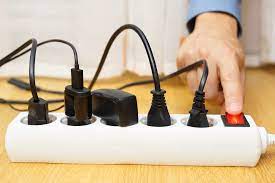Are Surge Protectors Necessary? Here’s What They Really Do

Surge protectors are an essential tool for protecting your electronic devices from sudden, unexpected power surges. They are designed to regulate the flow of electricity, preventing voltage spikes from damaging your equipment. But are they really necessary? In short, the answer is yes. Here’s what you need to know.
What is a power surge?
A power surge is a sudden increase in voltage that can occur in your electrical system. This can happen for a variety of reasons, such as lightning strikes, power outages, or overloaded circuits. These spikes in voltage can cause serious damage to your electronics, leading to costly repairs or even total failure.
What are surge protectors, and how do they work?
A surge protector is a device that is designed to regulate the flow of electricity and prevent power surges from damaging your equipment. They work by diverting excess voltage to the ground, ensuring that your electronics receive a stable, consistent flow of electricity.
Surge protectors come in a variety of forms, including power strips, wall outlets, and stand-alone devices. Some are designed specifically for high-tech equipment like computers, while others are more general-purpose and can be used for a variety of devices.
Are surge protectors really necessary?
The short answer is yes. Without a surge protector, your electronic devices are vulnerable to sudden, unexpected power surges that can cause serious damage. In addition, some warranties may not cover damage caused by power surges, which means you could be on the hook for expensive repairs or replacements.
In fact, surge protectors are so essential that they are required by many building codes and standards. For example, the National Electrical Code (NEC) requires surge protectors for all new residential and commercial construction, as well as for many renovations and upgrades.
What should I look for in a surge protector?
When shopping for a surge protector, there are several factors to consider. First, consider the Joule rating, which indicates how much energy the device can absorb before failing. Look for a high Joule rating, as this will provide greater protection for your electronics.
You may also want to consider the number of outlets on the surge protector, as well as any additional features such as USB ports or Ethernet protection. And finally, be sure to look for a surge protector from a reputable brand, as this will ensure that the device is reliable and effective.
In conclusion, surge protectors are an essential tool for protecting your electronic devices from power surges. Without them, your electronics are vulnerable to damage that can be both costly and inconvenient. By investing in a quality surge protector, you can ensure that your electronics are protected and that you can enjoy them for years to come.




